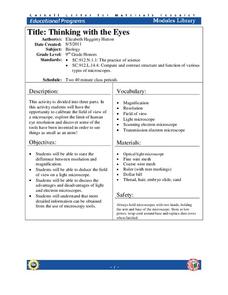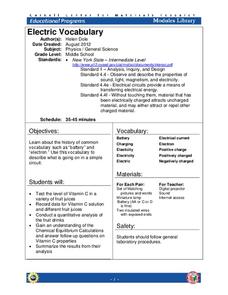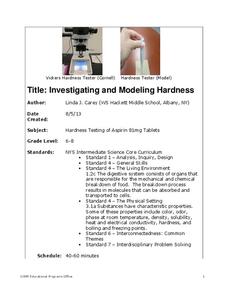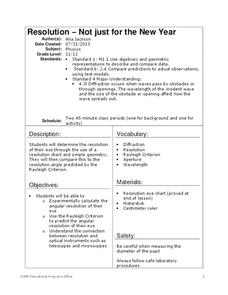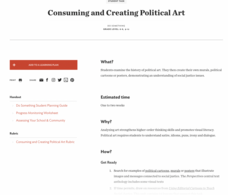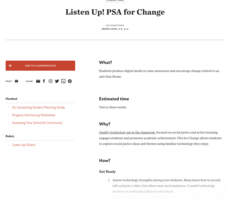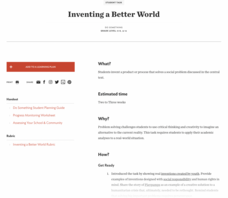Cornell University
Polymerization
Explore condensation polymerization and additive polymerization through hands-on activities. Young scholars first model additive polymerization with paperclips. They finish the activity by using condensation polymerization to create a...
Cornell University
Beam Focusing Using Lenses
Explore optics using an inquiry-based experimental approach! Young scholars use a set of materials to design and build a unit capable of focusing a beam of light. They experiment with different lenses to determine the best approach to...
Cornell University
Thin Films
Combine mathematics and science to calculate measurements of unmeasurable materials. Individuals use knowledge of density and volume to determine the thickness of the film used in production. They also apply stoichiometry to...
Cornell University
Thinking with the Eyes
Objects are larger (or smaller) than they appear! Scholars use a laboratory investigation to explore the difference between resolution and magnification. The activity allows them to calculate the size of the field of view of their light...
Cornell University
Building a Compound Light Microscope
What better way to learn how to use a microscope than building your own? A lab investigation has scholars use lenses from magnifying glasses and sheets of cork to design their own compound microscopes. They calculate focal length...
Cornell University
Optical Simulation of a Transmission Electron Microscope
Don't have an electron microscope? Have your classes build the next best thing! A hands-on lesson asks scholars to build a model of Transmission Electron Microscope (TEM). They then use their models to identify the function of each...
Cornell University
Electric Vocabulary
Practice electric vocabulary using multiple methods. Learners begin by watching a video that explains vocabulary related to electric currents. They match vocabulary cards to practice and then create an electric circuit. Using the...
Cornell University
Mechanical Properties of Gummy Worms
Learners won't have to squirm when asked the facts after completing an intriguing lab investigation! Hook young scholars on science by challenging them to verify Hooke's Law using a gummy worm. Measuring the length of the worm as they...
Cornell University
Investigating and Modeling Hardness
Model hardness testing with a self-designed hardness test. Young scholars rate the hardness of different types of aspirin using the Vicker's Hardness scale. They then relate hardness to the solubility of each aspirin tablet.
Cornell University
Splitting Water with Electricity
Explore how electricity splits water molecules into hydrogen and oxygen. Learners begin by calculating the voltage necessary to separate the water. They then perform the experiment and measure the ratio of hydrogen and oxygen bubbles.
Cornell University
Resolution—Not Just for the New Year
Experiment with optical resolution using an inquiry-based lesson. Young researchers calculate fellow classmates' optical resolutions. They apply the information to understand the inner workings of optical instruments.
Science Matters
Lotusland
It's time for a field trip! Scholars take their new-found knowledge of adaptations and seed dispersal on a field trip to a local botanical garden. They gain an up-close look at how ecological interdependence works in a distinct...
Social Media Toolbox
Social Media Education
Show what you know about social media! The 16th and final lesson plan in The Social Media Toolbox gives pupils the opportunity to share their social media experiences with their school communities. Groups identify the most important...
ReadWriteThink
Webcams in the Classroom: Animal Inquiry and Observation
Boost observational skills with an inquiry-based lesson that takes scholars on a virtual field trip. With help from webcams, learners observe animals in a zoo or aquarium. Observations go into a journal and a discussion is held to review...
Teaching Tolerance
Act Up! Drama for Justice
A lesson turns young historians into playwrights to understand and speak out against social injustice. Pupils work individually or in groups to write and perform monologues that deliver personal messages on social justice. Writers then...
Teaching Tolerance
Community Arts Showcase
An art showcase encourages class members to explore the themes of social justice and tolerance. They create an original artwork, engage in group discussions, and journal writing. The art gallery also provides a chance for families and...
Teaching Tolerance
Consuming and Creating Political Art
A picture is worth a thousand words, but political art may be worth even more! After examining examples of political cartoons, murals, and other forms of public art, class members create their own pieces to reflect their ideals and...
Teaching Tolerance
Listen Up! PSA for Change
Challenge scholars to speak up about a topic by creating a public service announcement or social media blitz about an issue they feel passionate about. Have them research their issues, then decide the best way to take their messages to...
Teaching Tolerance
Inventing a Better World
From play pumps that provide clean water to shoes made from trash, innovators change the world one invention at a time. After researching various inventions, young entrepreneurs develop their own. Extension opportunities include prompts...
Teaching Tolerance
Journalism for Justice
Roll the presses! Or at least have your class members participate in the time-honored tradition of the student press by creating their own newspapers or journalist pieces on a social problem. After conducting research and collaborating...
Teaching Tolerance
Film Festival
Everybody's a critic—even your pupils! Using the included resources as a guide, screen films related to social justice and ask film enthusiasts to critique them. Publish the reviews for your school community or develop a film festival...
Curated OER
Quest for Gold
Students identify people involved in the Olympics in the past and explain how their ideas and actions have changed others' lives. they take notes during research and present the information in written or picture format.
Curated OER
English Vocabulary Skills: AWL Sublist 8 - Exercise 2a
In this online interactive English vocabulary skills worksheet, learners answer 10 matching questions which require them to fill in the blanks in 10 sentences. Students may submit their answers to be scored.
Curated OER
Once Upon a Time
High school pupils research online to complete a family tree and explore their ancestry. They view a sketch of a family tree, and brainstorm questions to ask their parents about their heritage. They also diagram their own family tree. In...
Other popular searches
- Bus Schedules
- Reading a Schedule
- Daily Schedules
- Reading a Train Schedule
- Reading Schedules
- Demand Schedule
- Death Schedules
- Field Trip Schedule
- Read a Schedule
- Making a Schedule
- Reading a Bus Schedule
- Reading Bus Schedules



